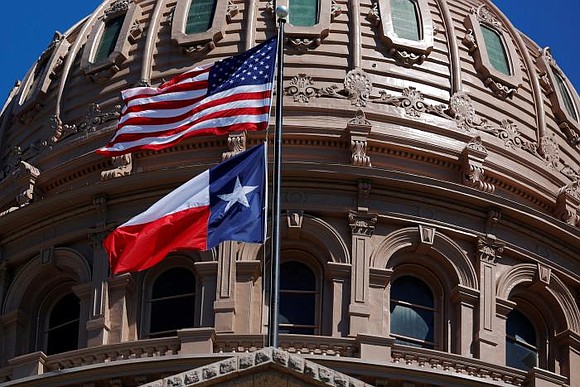What It Was Like To Be At The Fight On The Texas House Floor
CNN/Stylemagazine.com Newswire | 5/30/2017, 10:17 a.m.
By Chris Cillizza
CNN Editor-at-large
WASHINGTON (CNN) -- On Monday, at the end of the Texas legislative session, things took a very nasty turn. Protesters unhappy with a bill passed through the legislature that would ban so-called "sanctuary cities" stormed the chamber, forcing a tense standoff that led to an altercation -- the details of which are unclear -- between Republican and Democratic legislators. Texas Tribune editor Emily Ramshaw witnessed all of it. Our conversation about the fight -- as well as what else went on and whether there's going to be a special session -- conducted via email and lightly edited for flow is below.
Cillizza: The fight over SB-4 -- the Texas "sanctuary cities" ban -- drew massive attention nationally on Monday. Was it expected?
Ramshaw: The bill, complete with "show-me-your-papers" authority for local law enforcement, made huge waves throughout this year's Texas legislative session, with endless hours of emotional testimony, rallies and protests, and passionate speeches from the floor of the House and Senate. But that all largely wrapped up several weeks ago, when the bill finally passed.
Monday was supposed to be mostly ceremonial -- the final day of the regular legislative session -- and all was quiet in both chambers. The only drama we expected was the possibility of some last-minute wrangling over Texas' "bathroom bill," which hadn't passed due to a stalemate at the Capitol, and was expected to send us into legislative overtime.
Then a large, well-organized SB-4 protest broke out at the Capitol, and protesters flooded the gallery of the Texas House. They were so noisy that the House's work ground to a halt as state troopers worked to get the protesters under control.
Cillizza: So, we have a Republican representative calling immigration officials to get rid of protesters. And then saying he was assaulted by two Democratic representatives. Can you walk us through what happened? Or what we know?
Ramshaw: Amid this protest, we now know that an angry Republican state representative, Matt Rinaldi of Irving, Texas, told some of his Hispanic Democratic colleagues that he had called US Immigration and Customs Enforcement on the protesters -- believing that some of them were undocumented immigrants. This statement led to a tussle on the House floor, and while we couldn't hear what was said, lawmakers on both sides accused the other of threatening violence.
Rinaldi says a Democratic lawmaker, Poncho Nevarez of Eagle Pass, Texas, "threatened my life." He said he was "pushed, jostled and someone threatened to kill me."
Nevarez told our reporters he did put his hands on Rinaldi, but that he was never going to "shoot the guy." He tweeted that Rinaldi was "a liar and a hateful man."
In a press conference after the skirmish, another Democratic lawmaker, state Rep. Justin Rodriguez of San Antonio, said he heard Rinaldi threaten to "put a bullet in one of my colleagues' heads." Rinaldi didn't dispute that but said he was speaking in self-defense.
Cillizza: There's now lots of talk of a special session. Why?
Ramshaw: The talk of a special session is not related to the fight on the House floor, or to the "sanctuary cities" bill -- but it is emblematic of the incredibly high tensions in the Texas Legislature this session. House and Senate leadership ended up in a major standoff at the end of the session over whether or how to regulate bathroom use for transgender Texans.
The Senate wants a very restrictive version of the bill; the House had no real interest in playing ball. At the end of the day, some other must-pass legislation was taken hostage by the Senate over the bathroom issue and one other property-tax election issue -- and now that the session has ended without action on those bills, it's likely Governor Greg Abbott will call them back for more. The governor has said he'll make a decision on a special session by the end of the week.
Cillizza: What else happened that's worth noting in this most recent session, legislatively speaking?
Ramshaw: State lawmakers passed a $217 billion two-year budget; they passed overhauls to the state's troubled child welfare system; they outlawed the most common form of second-trimester abortion; they passed legislation to allow adoption agencies to reject parents on religious grounds; and under pressure from the courts, they softened the state's voter ID law. The governor has to either sign those bills or let them become law.
In addition to SB-4, the governor has already signed a bill establishing a statewide framework for regulating ride-hailing companies like Uber and Lyft.
Cillizza: Finish this sentence: "The political impact of this latest legislative sanctuary city fight on Texas politics will be ." Now, explain.
Ramshaw: The political impact of this latest legislative "sanctuary cities" fight on Texas politics will be brutal on the GOP's attempt to lure Latinos to the party.
Texas' demographics are changing rapidly, and moderate Republicans in the state know they have to aggressively pursue Latino voters if they want to maintain political control. By pursuing legislation that many --- if not most --- Latinos here perceive to be discriminatory, hateful and threatening to them and their families, Republicans are not endearing themselves to a voting bloc some in their party want to be pursuing.








